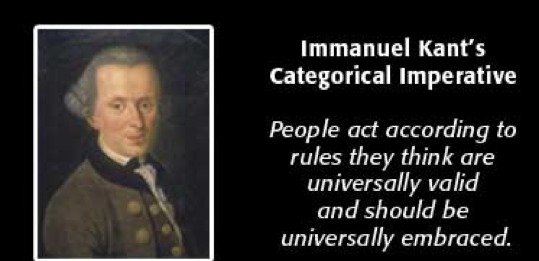Sign up for FlowVella
Sign up with FacebookAlready have an account? Sign in now
By registering you are agreeing to our
Terms of Service
Loading Flow



Immanuel Kant

Kant's Categorical Imperative:
Categorical- applies in all situations
Imperative- commanding and authoritative
Maxim- The reason for an action
Kant said one must act as their Maxim were to a universal law. This mean that one must act in a way they want everybody to act all the time.
Immanuel Kant main question for Hume was, how are we we even able to think? Kant denied the conclusion that knowledge is gained only through experience. He said that knowledge must first be perceived. Kant believed that intuition preceded experience. Kant also said that perceptions of the external adapt to our forms of intuition; an example of this would be water when pored into a glass then takes the shape the the glass.
Das Ding An Sich - The Thing in its Self
Kant said that there is and entire separate thing in the noumena and that humans will never have certain knowledge of things in themselves, yet we know it exists.
Kant gives a name to the knowledge that can be know without experience , he calls it "A Priori" knowledge
Kant puts a limitation on our knowledge however, saying that we can only understand what we perceive.